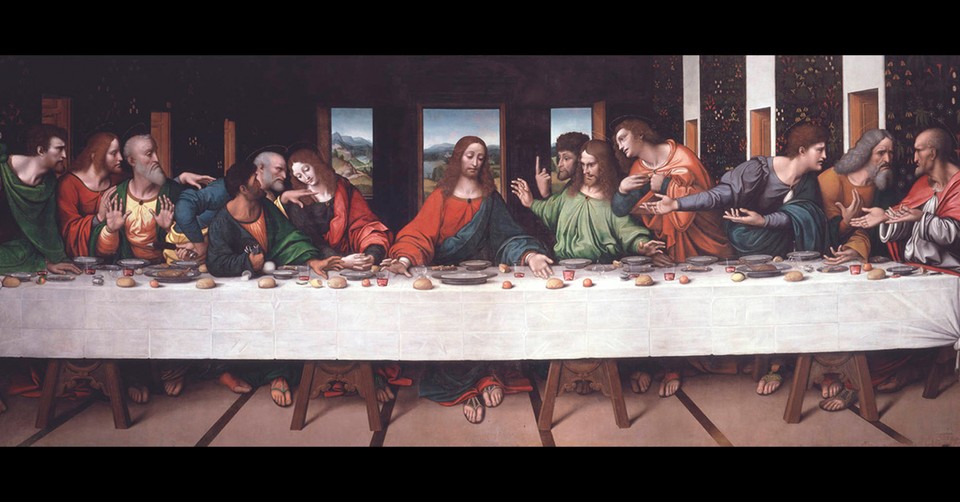The Last Supper: 3 Ways Food Connects Us to God

Food brings back memories.
Think about a memorable meal in your life. You probably remember exactly what it was, where you had it, who you were with, and even the atmosphere. Food somehow ingrains itself into our very lives in a way that few things do.
We have business meetings over lunch, family reunions over BBQs, secret family recipes that are closely guarded, and our go-to meals that we seem to eat at least once a week (it's tacos at my house!) Food isn't just for nourishment or to satiate a rumbling stomach; it's a way of life. Food connects us to community, culture, ancestors, countries of origin, and especially to our God.
And there is one meal in particular that is unique amongst every other meal ever eaten throughout history — The Last Supper.
The Surprising Importance of Food
Although Luke's account is only 13 verses long, it is packed with at least three massive realizations for Christians as we look to celebrate Communion during Holy Week. The motif of meals in Jesus' ministry plays a surprisingly central role in almost everything Jesus does. To quote Tim Chester's great book A Meal with Jesus: Discovering Grace, Community, and Mission around the Table:
"In Luke's Gospel Jesus is either going to a meal, at a meal, or coming from a meal."
Food was not only central in Jesus' activity, but it would also point toward His identity as the resurrected Messiah (you can check out my other article on how food helped the disciples discover Jesus had really come back from the dead here). It was pivotal in His miracles, in His analogies of who He is, and provided the perfect setting to talk about the Kingdom of God.
So let's look at Jesus' most important meal, His last one, as we discover just how pivotal food is alongside our faith. Here are three reasons food connects us to God through Christ.
1. Food helps us slow down and prepare ourselves to honor Christ.
Luke 7:9-12 Then came the day of Unleavened Bread on which the Passover lamb had to be sacrificed. Jesus sent Peter and John, saying, "Go and make preparations for us to eat the Passover." "Where do you want us to prepare for it?" they asked. He replied, "As you enter the city, a man carrying a jar of water will meet you. Follow him to the house that he enters, and say to the owner of the house, 'The Teacher asks: Where is the guest room, where I may eat the Passover with my disciples?' He will show you a large room upstairs, all furnished. Make preparations there."
Food is meant to be prepared, not just consumed. Most of us think more about the final product regarding food. We want to know two things above all else: "Does it look appetizing?" And "Does it taste good?" Palatable food and presentable food are important for sure, but these are only possible after the meal is prepared.
The most used room in every house is the kitchen. It's where the cooking, and often even where the eating happens — but it's also where conversation and connecting happen as the meal is prepared. In Jesus' time, eating the Passover meal was a careful process of gathering the right ingredients, setting the mood, recounting their history, passing on tradition, and preparing their hearts to be thankful to God. This process was not to be rushed or glossed over. They slowed down and honored God, preparing their hearts and minds to take in all that the meal and its history had to offer.
Slow Down: As you prepare a meal this week, tell a story or recount a time when a meal had a profound influence on you. Spend some bonding time with friends and family as you prepare the meal. While making the meal, cooking the food, preparing the table, setting out silverware, chopsticks, soup bowls, or appetizers, spend time with God in prayer or with others in conversation. Then as you sit down to eat, pray that God slows you all down to eat leisurely and with gratitude. Don't leave the table too soon, even if you're done eating before everyone else!
2. Food helps remind us of how thankful we are for Christ.
Luke 7:14-16 When the hour came, Jesus and his apostles reclined at the table. And he said to them, "I have eagerly desired to eat this Passover with you before I suffer."
Every time we have a meal, we have a new opportunity to give thanks to God for the gift of new life in Christ. Jesus's last meal with His disciples was intentionally close to the moment He would be crucified. He wanted His disciples to connect His suffering and death to the covenant elements of bread and wine in order to see the magnitude of the New Covenant He was making with them. Just as the Old Covenant cost the blood and life of sacrificial animals, the New Covenant would cost the blood and life of Christ. Every time the disciples, and later Christians everywhere, picked up a piece of bread and drank from a cup of wine or juice while remembering Christ, it was a powerful reminder of how good Christ has been to humanity.
Another striking realization from this passage is Christ's eagerness to have this last meal with His disciples even as He knows the terrible path ahead of Him. While the disciples may not have grasped the magnitude of how Christ would suffer, He did, and still, He was able to recline at the table, look forward to a meal with His most trusted friends, and give thanks to God.
Enjoy the meal, even if life isn't enjoyable: Even as Jesus was criticized publicly, questioned, rejected, and even as He knew how people would torture and kill Him, He had the ability to enjoy the moment with the people around Him. As you sit down to eat with others this week, enjoy their presence and permit yourself to enjoy the meal and the company even if life isn't enjoyable. Talk about something light-hearted, put work or drama on the sidelines for 30 minutes, and realize that good friends, co-workers, and family can help even in the worst of times.
3. Food helps us remember that someday we will have a future with Christ.
Luke 7:17-19 "After taking the cup, he gave thanks and said, "Take this and divide it among you. For I tell you I will not drink again from the fruit of the vine until the kingdom of God comes." And he took bread, gave thanks and broke it, and gave it to them, saying, "This is my body given for you; do this in remembrance of me."
Our future with God is celebrated and described as a great feast. Jesus wasn't just looking forward to His suffering and death; He was looking past it to the time that He would return and bring God's Kingdom once and for all. The meal was to be the constant reminder for generations that all who had given their life to Christ had nothing to fear because their future with Him was secured.
Echoing the imagery of Isaiah 25:6-8, Jesus gives us another peek into the future feast we'll have with God and all of His people. Whether we all literally sit at the same table and eat maybe be up for dispute, but what isn't is God's instance that we will all gather around Him, in the creation He has made for us, and enjoy not only great food and drink but ultimately - God's presence. He is and will be the ultimate host for all of God's people.
We all have to eat. It seems like such a simple statement, but from the moment we are born, humans have the need and desire to be fed. God has given us an appetite so that we are reminded of how utterly dependent upon Him. We would not have food to eat and water to drink without His good creation, and every time we eat and drink, we have a simple but powerful reminder that there is a God who exists and who provides for us. But this is not the only hunger we have; we thirst for righteousness, groan for our world and our bodies to be restored, and (hopefully) desire to be in the presence of the ultimate host, King, Messiah, and provider who has invited us into His home for a feast for all time. The door is open, the table is set, the food is waiting, and here comes the host of hosts.
Kile Baker is a former Atheist who didn’t plan on becoming a Christian, let alone a Pastor, who now writes to try and make Christianity simple. Kile recently wrote a study guide to help people “look forward to and long for Heaven.” You can get one on Amazon here. He also writes at www.paperbacktheologian.com. Kile is the grateful husband to the incredibly talented Rachel, Dad to the energetic London and feisty Emma and Co-Lead Pastor at LifePoint Church in Northern Nevada. He single handedly keeps local coffee shops in business.
Originally published April 14, 2022.





